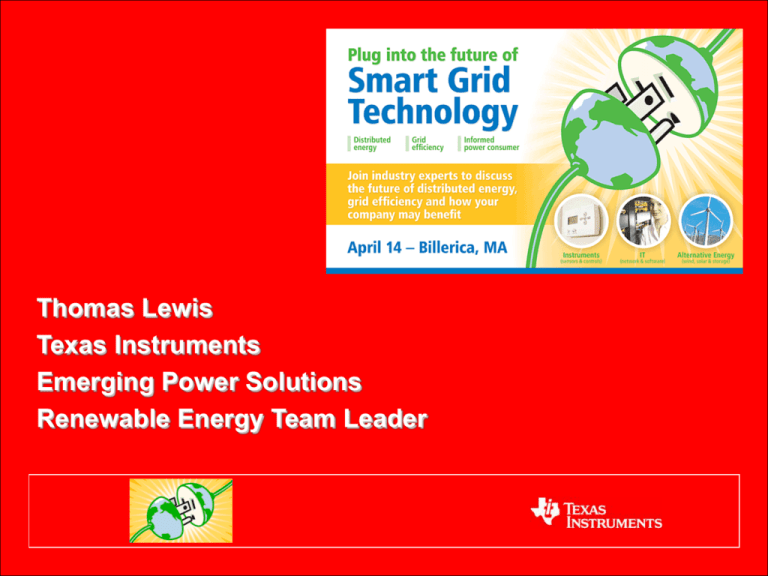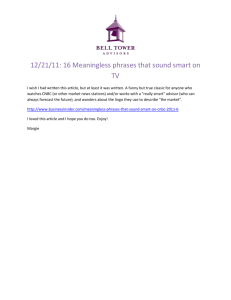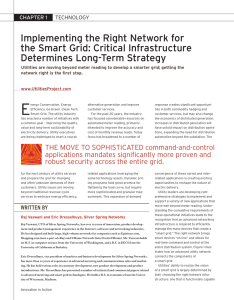Texas Instruments
advertisement

Thomas Lewis Texas Instruments Emerging Power Solutions Renewable Energy Team Leader “Smart Grid” is more than Smart Metering Where IC Vendors Can Help • Technical Requirements of the Grid – Low Cost Sensing Solutions need to be deployed across the network – These solutions must be capable of harvesting “real” information from raw data – This real information must be turned into “actionable intelligence” (i.e., recommendations for control, dispatch and/or network operations) – This “actionable intelligence” must be integrated into the utility’s operational systems – Some of these operational systems must be allowed to become background, automated, control applications – Any automated control applications must be able to control end points with validated results • Required Smart Grid Building Blocks – Distributed intelligent sensing and control nodes (grid sensors) – TWO-way, open, high speed, low latency communications – Edge and back office analytics software TI microcontroller portfolio Application Spaces Fire Detector TI Complete Smart Meter Solution • TI enabling technology ... I – Complete reference design V MSP430FE42x ESP E-Meter SoC RTC, LCD • Register measures energy CC11xx ISM-band SoC Radio, MCU – Metrology and control – MSP430FE-based OPA561 • Wide Area Network – Two-way utility-to-meter – CC11xx ISM + C28xx PLC • Home Area Network – Two-way meter-to-home – CC25xx 802.15.4 + C28xx PLC • Efficient Power Supply OPA353 TMS320F28xx Flexible PLC Controller 32-bit DSP A B C D E TEST CUM REAC MAX kW HVD3082E RS485 TRF7960 Pre-payment RFID N L CC25xx 802.15.4 SoC/LNA/PA Radio, MCU 1.8V 3.3V TPS70251 LDO Enfora GSM/GPRS Module Enabler III TL3842 Isolated AC/ DC kWh Business Models and Standards • There are HUNDREDS of projects across the country – all “testing out” various business models and technologies to support the Smart Grid movement (http://maps.google.com/maps/ms?ie=UTF8&hl=en&msa=0&msid=11 5519311058367534348.0000011362ac6d7d21187&ll=53.956086,14.6 77734&spn=23.864566,77.519531&z=4&om=1) • Ultimately, the power utilities must see value (i.e., ROI) in putting in the required capital • IP, Homeplug, Zigbee, 802.11 are standards widely accepted in Smart Grid pilots today; IEEE 1547.4 gaining attention • DNP3 and IEC61850 are used for distribution and substation equipment communications • World needs a Smart Grid that can utilize these standards and allow for true OPEN integration (defined as allowing a provider to independently build solutions that can seemlessly connect to the network once granted security and permission by the utility) of multivendor ecosystems. The Smart City Project in Boulder, CO • $100M Project (85% paid by the utility) • Driven by the “Smart Grid Consortium” (formed Dec. 2007) • Xcel Energy (utility) • Current Group (Smart GridTM hardware and software) • Accenture (project management) • GridPoint (IT platform for utilities) • OSIsoft (data collection and management) • Smart Synch (metering) • Schweitzer Engineering Laboratories (protection, monitoring & control across transmission lines • Ventyz (work management software) • Estimated June completion • Enel S.p.A. of Italy completed the first Smart Grid city experiment in 2005 - the Telegestore project. • Proven to deliver annual savings of 500 million € at a project cost of 2.1 billion €.




